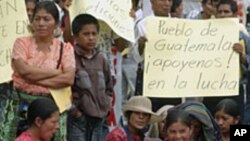A United Nations conference on the world's poorest countries adopted a plan Friday that stresses the importance of foreign investment and the private sector in lifting millions of people out of poverty.
The fourth Conference of the Least Developed Countries ended with the goal of halving the number of the current 48 Least Developed Countries, or LDCs, by 2020.
The head of the Global LDC Coordination Bureau is Nepal Foreign Minister Upendra Yadav. He says achieving this goal is in the interests of the international community.
"No country or region can remain aloof from each other. Prosperity for all is a must for sustainable peace and global security. Islands of prosperity cannot be sustained in a sea of poverty for long," he said.
The emphasis on productive capacity -- energy, infrastructure and agriculture -- marked the most significant difference from the last LDC action plan in Brussels in 2001, which concentrated on health, education and other social programs.
The nearly 50-page Istanbul action plans set out recommendations for rich and poor countries and covers climate change, aid, health and foreign direct investment. It stresses the importance of developing cooperation and support between LDCs and emerging markets.
As for the goal of halving the number of LDCs, Cheick Sidi Diarra, U.N. undersecretary general and high representative for the LDCs, says five or six countries are in line to "graduate" in the next two years, including Equatorial Guinea, Angola, Timor Leste, Bangladesh and Nepal.
"All the advantages would be withdrawn from them once they graduated. In order to make it acceptable and agreeable, it has been decided that a process of smooth transition will be put in place in order that these countries don't lose abruptly the assistance that they (are) receiving from the international community," Diarra said.
Diarra says with the world still struggling to shake off the worst financial crisis since the Great Depression of the 1930s, attaining such targets will be difficult. That is why, he says, the future lies more with foreign direct investment and the private sector.
Turkish Foreign Minister Ahmet Davutoglu says Turkey has become a voice for the LDCs and will continue to do so. "Turkey will be happy to host again just for a much broader, much more comprehensive assessment in 2015," he said.
Turkey also announced it will continue its support to LDCs by offering 1000 university scholarships. Turkey, as a percentage of gross domestic product ((GDP)), is now among the biggest donors to the developing world.




